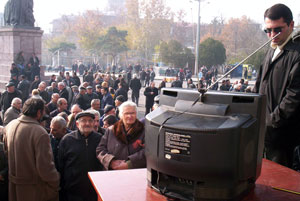Well, the constitutional amendments referendum is over. It’s history. So right now it doesn’t even matter whether the referendum proceeded in an environment of serious or minor violations, whether the number of violations were terrible or only slightly awful, etc. Indeed, the opposition gave only 72 hours to the CEC to consider the referendum results invalid but hardly anyone believes that the CEC Chairman G. Azaryan will come up with apologies.
Nevertheless, it is the estimation of international entities that it is worth to analyze rather than the proceedings of the referendum themselves. And honestly, that estimation contains certain notes of contempt towards the whole process. The estimation of the observers of the Council of Europe regarding disparity between the active level of participation and the actual number of voters causes a lot of suspicion. Thus, the observers noticed that the voters had been extremely passive, however the PEC presented completely different figures. Simply said, there were either stuffings at the polling-stations or figures were totally exaggerated. That is an exaggeration of the number of thousands of voters (otherwise there wouldn’t be that obvious contradiction between the presented votes and the voters’ passive level of participation). In that case, eventually why did the international community announce that the referendum in general corresponded to democratic criteria? This question may be answered by the two different announcements heard from two different podiums. First, the extraordinary representative of Belgium in OSCE announced that by this constitution the perspectives of “solving the conflict of Nagorno-Karabagh becomes more visible”. On the same day, the ambassador Vladimir Kazimirov announced that the year 2006 might become a moment of “justice” regarding the solution of Nagorno-Karabagh conflict. Thus, for the sake of “great peace” the international community could not even dare to not notice such “nuances” as the violations registered during the referendum.
The fact that in the result of widespread electoral violations in Armenia acquired a worse constitution is only part of the issue. In the future it might be possible to correct those violations by appealling the referendum results or proposing a new referendum. But there is one specific thing, the correction of which will be very difficult. That is – the consequences of involving different groups of the society in falsifications.
So what really happened? Various entities of the government explained to the whole generation (young people and students) that the only way to achieve something in Armenia is to make a deal with self-conscience and lie to people on TV. Tens and hundreds of youth organization leaders, who have been taken care of quite well, were one by one glorifying the “constitutional amendments” and the “transperant proceedings” of the referendum. Meanwhile, they knew exactly what’s going on in reality. And please imagine that there was no one among those organizations, who would tell the truth. Furthermore, nobody feared anything. There was simply no one, who would jeopardize his/her future career for the sake of truth. In fact, this is the most serious consequence of the referendum.
Thus, the government has clearly defined who among the young people would hope for a better career and who would not. The criteria of elections were also clarified. Besides, it was defined that the only way for young people to “live properly” in Armenia is to commit all types of violations and falsifications without a feeling of regret and sorrow. This would help the abovementioned young people to deserve the respect and praises of their mothers and aunts (e.g. “oh, sweetheart, i’m so proud of you, you are my future minister”).
By watching the “intelligent” young people, activated during the referendum, we may draw a clear conclusion what Armenia is going to look like in about ten years. Moreover, it is going to be very difficult to change the situation because the government has currently started to recruit more or less smart young people and make them play with the government rules. And the young men don’t have a choice. The ones who don’t pick that choice will have to remain as “regular people” so that the well-prepared young “authorities” lead them to democracy.

